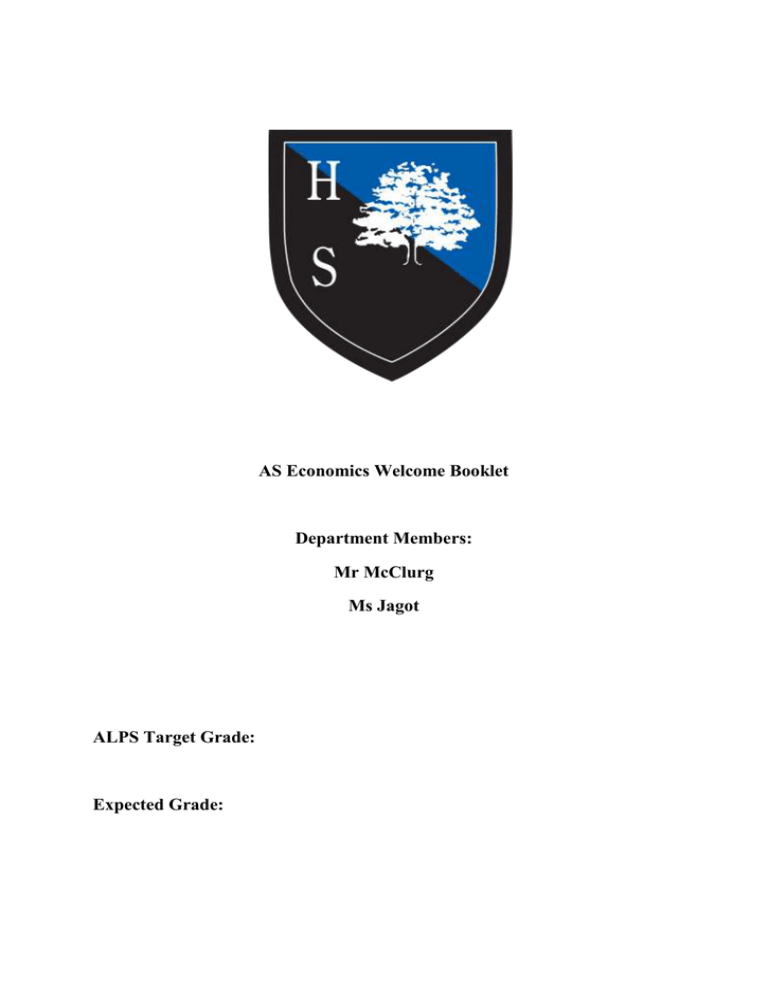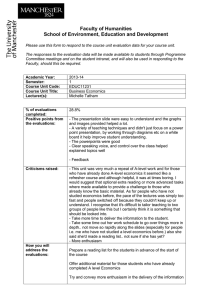AS Economics Welcome Booklet Department Members: Mr McClurg
advertisement

AS Economics Welcome Booklet Department Members: Mr McClurg Ms Jagot ALPS Target Grade: Expected Grade: Welcome: Hello and welcome to Heathcote Sixth Form’s Accounting and Economics department. You have embarked upon a fascinating course that teaches both theoretical and vocational skills. You have chosen to study A-Level Economics. The course is academic in nature; where your ability to write persuasively and critically is crucial. The ability to deduce from data to enhance your argument, and keep up to date with current events will enable you to do well in this subject. You will be tested regularly. From early on in your course you will be assigned an ALPS Grade and an Expected Grade. ALPS Grades are school target grades which represent the minimal level of achievement that we expect from you. Expected Grades are what we use to determine your actual progress. These will be challenging and change depending upon your homework/test results. Any test result that falls below the ALPS Grade will result in a resit being done and we communicate regularly with parents on your progress (both outstanding and fail). A-Level Economics is formally assessed at the end of the year, with Units 1 and 2 examined in May 2015. There is no coursework. The examinations are time-tight, where 75 minutes is given to achieve 75 marks. The responsibility of your success is on you. After each test, you will be required to review your feedback and set specific targets to improve. You will then be required to meet those targets and evidence will be sought to ensure you are improving. Finally on behalf of the department, I hope that you enjoy this subject and that you find it engaging and challenging enough. You only get out of this what you put in. We have opportunities available for students who are interested in stock-broking, economics masterclasses, and visits to the London School of Economics for Public Lectures. Mr McClurg (Lead Teacher of Accounting & Economics) Expectations on this course From the teacher: All students can achieve the best grade possible All students will enjoy what they learn Subject knowledge is up-to-date as well as current resources available for all students Homework is given weekly. This will be assessed weekly, with appropriate feedback (including guidance on how to improve your work) Tests/Summative Assessment every 3-4 weeks, with individual teacher time to discuss results and personalised feedback for each student. Feedback will be given in the next lesson Dedicated student time after school for any questions/queries All resources are placed on the Central Resource Library, so students can access their work during absence From the student: All students are to uphold a respectful and courteous manner to each other and to the teacher at all times, inside and outside of school (e.g. on school trips) Attendance and punctuality is crucial. If you are likely to be absent for a few days, it is your responsibility to get all materials and catch up with all work missed, including doing any assigned homework. Persistent lateness to, and absence from, class will result in disciplinary procedures, in accordance to sixth form policy A minimum of 3 hours of study per week (outside of class) is required to properly do all the assigned reading and work for the class. If you want to do well, a recommended 5 hours per week should be spent on independent study Maintain an organised work folder. We will look through your folder and books every 3-4 weeks. All work should be brought to class, including all past papers and stationery (calculator, pens etc.) Homework to be submitted on time with your name placed at the front of your work. Not doing so, without a valid reason, will result in detention. Persistent lateness of homework will result in contact with parents/guardians and referral to the Lead Teacher Attendance at revision sessions held is voluntary, but it is in your best interest to attend. Those that have attended revision sessions previously have done better in their overall grade outcomes If you have any problems during this course please contact us as soon as possible. Our door is always open. What you will learn (useful as revision aid) Unit 1: ECON1 – Markets and Market Failure Examination: 1 hour 15 minutes Unit 2: ECON2 – The National Economy Examination: 1 hour 15 minutes Unit 1: ECON1 – Markets and Market Failure The Economic Problem • Nature and Purpose of Economic Activity • Economic Resources • The Economic Objectives of Individuals, Firms and Government • Scarcity, choice and the allocation of resources • Production Possibility Diagrams • Value Judgements, Positive and Normative statements The Allocation of Resources in Competitive Markets • The Determinants of the Demand for Goods and Services • Price, Income and Cross Elasticity’s of Demand • The Determinants of the Supply of Goods and Services • Price Elasticity of Supply • The Determination of Equilibrium Market Prices • Demand and Supply Analysis to Particular Markets • The Interrelationship Between Markets • How Markets and Prices Allocate Resources Production and Efficiency • Specialisation, Division of Labour and Exchange • Production • Economies and Diseconomies of Scale Market Failure • The Meaning of Market Failure • Public Goods • Externalities in Consumption and Production • Merit and Demerit Goods • Monopoly and the Allocation of Resources • Immobility of Factors of Production • Inequalities in the Distribution of Income and Wealth Government Intervention in the Market • Rationale for Government Intervention • Methods of Government Intervention to Correct Distortions • The Impact of Government Intervention on Market Outcomes • Government Failure Unit 2: ECON2 – The National Economy Introduction to Macroeconomics • The Measurement of macroeconomic performance • Macroeconomic Indicators • The Economic Cycle How the Macro-economy works: AD/AS analysis, the circular flow of income and related concepts • Circular flow of income • Aggregate Demand (AD) and Aggregate Supply (AS) Analysis • The Determinants of Aggregate Demand • Aggregate Demand and the Level of Economic Activity • Determinants of Short-Run Aggregate Supply • Determinants of Long-Run Aggregate Supply Economic Performance • The Objectives of Government Economic Policy • Economic Growth • Inflation and Deflation • Employment and Unemployment • The Balance of Payments on Current Account Macroeconomic Policy • Fiscal Policy • Monetary Policy • Supply-Side Policies Additional resources Textbook for the course: Economics for AQA 5th Edition (Alain Anderton) – required reading. Books must be purchased from the department The Economist – yearly subscription for £5 (available from dept) Department Website – advise you to bookmark this for twitter/competition info: http://www.heathcoteschool.com/accounting_and_economics.php Twitter: @HSEcon (Accounting/Economics resources/exam tips/news) http://www.tutor2u.net/ - fantastic resource, lots of economics materials; popular amongst students http://tutor2u.net/revision_notes_economics.asp - fantastic revision notes from tutor2u http://brynsaseconomicsblog.blogspot.co.uk/ -great applications of economic theory to practical examples http://www.s-cool.co.uk/a-level/economics - great revision tool for economics http://www.ft.com/home/uk - good for up-to-date economics news http://www.economicsnetwork.ac.uk/links/data_free.htm - economics data for research and projects http://www.economist.com/ - economics news Pre course tasks Before you begin this course, I want you to research online, and answer, the questions that follow. You must bring this work with you on the first day of your course. 1. What do we mean by economics – research and answer carefully (consider micro/macro components) 2. What are the four factors of production (give examples of each) 3. Draw and label the graphs (including axes) for the following: a. Demand Curve b. Supply Curve c. Production Possibility Frontier 4. Explain the three graphs above – why do they have a certain shape? Downward/upward sloping? Future studies Economics is a versatile subject that can help you in a number of careers. Not only could you find yourself working for big corporations, banks or the government but your qualification in economics could also be valuable support in a career like marketing, law, journalism or teaching.






